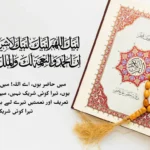The phrase Inna Lillahi Wa Inna Ilayhi Raji’un (إِنَّا لِلّهِ وَإِنَّـا إِلَيْهِ رَاجِعونَ) is a powerful and significant expression used by Muslims in times of grief or hardship. This phrase, which translates to Indeed, we belong to Allah, and indeed, to Him we return, is often recited when hearing news of death, loss, or any misfortune. It serves as a reminder of the temporary nature of life and the ultimate return to Allah.
| Allahumma Salli ala Muhammadin ﷺ |
| Astaghfirullah Rabbi Min Kulli | اَسْتَغْفِرُ اللّٰهَ رَبِّيْ مِنْ كُلِّ |
| Subhanallahi wa Bihamdihi Subhanallahil Azeem |
| Rizq Mein Barkat Ki Dua | دعاء رزق میں برکت |
Inna Lillahi Wa in Allah e Rajioon in Arabic, Transliteration and Translations
Arabic: إِنَّا لِلّهِ وَإِنَّـا إِلَيْهِ رَاجِعونَ
Transliteration: Inna Lillahi Wa Inna Ilayhi Raji’un
English Translation: “Indeed, we belong to Allah, and indeed, to Him we return.”
Urdu Translation: “بے شک ہم اللہ کے لئے ہیں اور ہمیں اسی کی طرف لوٹنا ہے۔”
Understanding the Phrase
The expression “Inna Lillahi Wa Inna Ilayhi Raji’un” is derived from Surah Al-Baqarah (2:156) in the Quran. It is a profound reminder that all life and everything we possess is a trust from Allah, and ultimately, we are destined to return to Him. Let’s explore the deeper meanings of each part of this phrase.
1. “Inna Lillahi” (Indeed, we belong to Allah)
This part of the phrase signifies that our existence, our lives, and everything we own belong to Allah. He is our Creator, and we are His servants. This belief instills a sense of humility, as it emphasizes that humans are not the ultimate owners of their lives or belongings.
In moments of loss, this reminder helps Muslims understand that whatever has been taken away was a gift from Allah, and He has the right to take it back. This realization fosters acceptance and patience.
2. “Wa Inna Ilayhi Raji’un” (And indeed, to Him we return)
The second part of the phrase emphasizes that our ultimate destination is back to Allah. Life in this world is temporary, and everything we experience here, whether happiness or sorrow, will eventually end. This part of the phrase reassures believers that after any hardship or loss, there is a reunion with Allah, which is the ultimate peace and reward.
This belief is particularly comforting in times of loss, as it reminds Muslims that this life is a test, and their patience and faith will be rewarded in the Hereafter.
The Significance of Reciting This Phrase
Reciting “Inna Lillahi Wa Inna Ilayhi Raji’un” serves multiple purposes in a Muslim’s life:
- Acceptance of Allah’s Decree: It helps Muslims to accept Allah’s will and the inevitability of loss and hardship.
- Remembrance of the Hereafter: This phrase is a reminder that life is fleeting and that the real, eternal life awaits in the Hereafter.
- Source of Comfort and Strength: Saying this phrase brings emotional and spiritual solace, as it encourages patience and reliance on Allah in difficult times.
Usage in Daily Life
While “Inna Lillahi Wa Inna Ilayhi Raji’un” is primarily used when hearing news of death, it is also recommended to recite it during any misfortune, calamity, or difficult situation. For instance, it can be recited when experiencing material loss, illness, or other trials in life. By saying this phrase, Muslims affirm their faith and trust in Allah’s wisdom and decree.
Quranic Context
In Surah Al-Baqarah, Allah mentions those who say “Inna Lillahi Wa Inna Ilayhi Raji’un” as being among the patient believers who are granted blessings and mercy from Allah:
“Who, when disaster strikes them, say, ‘Indeed we belong to Allah, and indeed to Him we will return.’ Those are the ones upon whom are blessings from their Lord and mercy. And it is those who are rightly guided.”
(Quran 2:156-157)
This verse highlights that those who respond to calamities with patience and remembrance of Allah are promised divine rewards and guidance.
Lessons from “inna lillahi wa in allah e rajioon in arabic”
- Life’s Temporary Nature: This phrase teaches us that life is short, and everything we cherish here will ultimately return to Allah.
- Strength in Faith: By reminding ourselves of Allah’s plan, we strengthen our faith and patience, especially in challenging times.
- Gratitude for Allah’s Blessings: Understanding that everything belongs to Allah encourages Muslims to be grateful for their blessings while they have them.
Benefits of Reciting the Phrase
- Patience in Trials: Reciting “Inna Lillahi Wa Inna Ilayhi Raji’un” helps individuals gain patience and control over emotional turmoil.
- Spiritual Growth: It serves as a way to strengthen one’s connection with Allah, deepening the understanding of life’s purpose and destiny.
- Emotional Relief: This reminder of Allah’s ultimate control brings emotional relief, as it shifts focus from grief to acceptance.
FAQs:
This phrase is recited whenever a Muslim faces a hardship, loss, or hears news of someone’s death. It is a way to express patience and reliance on Allah in difficult times.
The phrase means “Indeed, we belong to Allah, and indeed, to Him we return.” It signifies that all life and possessions are ultimately Allah’s and that we will return to Him.
No, it can be recited in any time of calamity, distress, or loss. It serves as a reminder of Allah’s sovereignty and a source of comfort and patience for Muslims.




